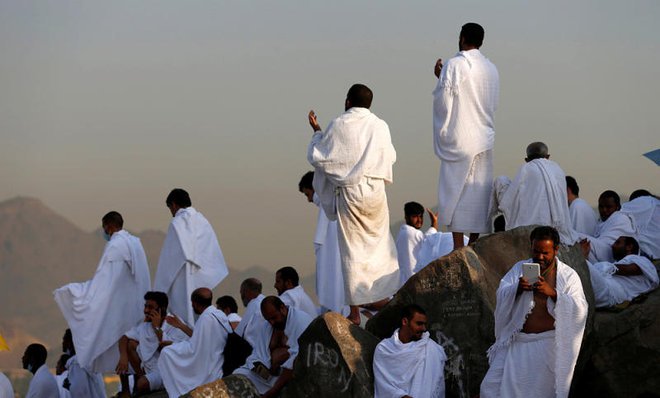
In the wake of the global pandemic, there is a dire need for future hujjaj to be better equipped to experience the spiritual healing of hajj without compromising on the external rites (manasik) of the hajj, writes Imam Dr. A. Rashied Omar.
This year 2022CE / 1443AH for the first time in three years one million hujjaj, most of them traveling from outside of Saudi Arabia, are blessed to pause and stand on the plains of `Arafah as part of the climax of the hajj.
It remains important to reflect on the impact the Covid-19 (Coronavirus) pandemic has had on hajj, and lessons we could draw from this. Undoubtedly, as a direct consequence of the Covid-19 pandemic over the past three years the noble intentions of millions of prospective hujjaj have been thwarted and remain unfulfilled because they have been unable to travel to perform the sacred duty of hajj. Notwithstanding this deleterious effect the pandemic is having on the hajj, I would like, however, to focus on the conditions that the Covid-19 pandemic is creating for a positive influence on the post pandemic and future performance of the manasik or rites of the hajj.
The pandemic has wrought untold loss and trauma on the world, and has compelled us to pause and reset almost every aspect of our lives which we have come to take for granted. It would be a travesty if we do not seize this moment to reflect critically on our lives at a personal and social level, locally and globally. Such reflection at this time, should include our contemporary culture and practice of the fifth and final pillar of Islam. This difficult yet extraordinary moment in history offers us a rare opportunity to reflect on whether the millions of annual pilgrims that we are accustomed to, are truly witnessing and obtaining the manifold benefits of the haj as proclaimed by Allah, the Sublime, in Surah al-Hajj, chapter 22 verse 28: They shall witness the benefits (manaf`i of the hajj) for themselves
For a very long time now, contemplative Muslim scholars, from different Islamic orientations, such as Imam Abu Hamid al-Ghazali (d.1111), Dr. `Ali Shariati (d.1977), and Shaykh Salman bin Fahd al-Oudah (b.1955) have lamented the manner in which the performance of the hajj has been reduced to external rituals which do not spiritually heal or morally rehabilitate the pilgrims. Shaykh al-Oudah, for example, aptly describes the contemporary state of the ummah in their relationship to the fifth and final pillar of Islam, the hajj, in the following quotation:
“It can be most startling to see how many pious Muslims are completely oblivious to the values and objectives of the Hajj, and of the effects it should have on the soul. The Hajj should bring about positive changes in a person’s life and person’s behavior. If scholars were asked about these matters as much as they were asked about the details of how to perform the external rites of the Hajj, it would be for the better.”
From my own personal experience of teaching hajj classes for the past three decades and having been fortunate and blessed to perform the hajj twice, I concur with the above viewpoint.
In order to mitigate this exclusive and sometimes fanatical focus on the external rites of the hajj by most hujjaj without regard to its personal transformative purposes of individual spiritual healing and socio-moral rehabilitation, serious intervention strategies are needed. The current global pandemic offers a unique opportunity to reflect deeply about how we could institute a reform process in which future hujjaj are better equipped and enabled to experience the great spiritual healing and moral transformation potential in the hajj experience without compromising the proper execution of the external rites (manasik) of the hajj. I would like to suggest three such strategies. These are not intended to be exhaustive but rather to prompt us to use this difficult and reflective moment to stimulate creative thinking and robust discussion around how we could improve the future experiences of the hajj and bring it closer to the great spiritual and ethico-moral benefits that our Lord and Sustainer had intended it for us.
1) Instituting More Robust and Comprehensive Hajj Educational Programmes;
2) Discouraging the Performance of Hajj Multiple times;
3) Censoring the Economic Exploitation of Hujjaj
The above three strategies are not exhaustive but could serve as a grist for the mill in exploring ways of creating the conditions for pilgrims to being better able to achieve the sublime purposes and goals of the hajj. I am sure there are other proposals and welcome them.
It is my considered view that the current Covid-19 pandemic is already having a significant impact on the hajj. We need to harness this difficult time to campaign for changes in the contemporary culture and practice of the annual hajj that will enable pilgrims to achieve the sublime purposes of the hajj of spiritual healing and ethico-moral rehabilitation.
We pray and make du`a that Allah, the Lord of Compassion, will grant them a Divinely accepted Hajj Mabrur and forgiveness of their trespasses.


